In the hinterland of the vast loess land of Qingyang County, Gansu Province, is a famous plateau, Dongzhiyuan. More than 2,500 square kilometers, Dongzhiyuan boasts the world's thickest layer of loess. On this land, the Qin Dynasty built the Great Wall, the Tang Dynasty built an imperial palace for short stays, the Jin Dynasty excavated the grottoes and the Ming Dynasty erected stone memorial archways… Layer upon layer of cultural and art treasures have accumulated here!
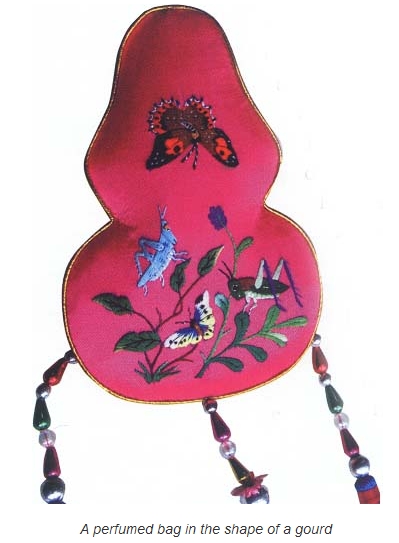
It is also here that a colorful world of the perfumed bag can be seen-a time honored object with a native flavor, featuring the rich regional culture.
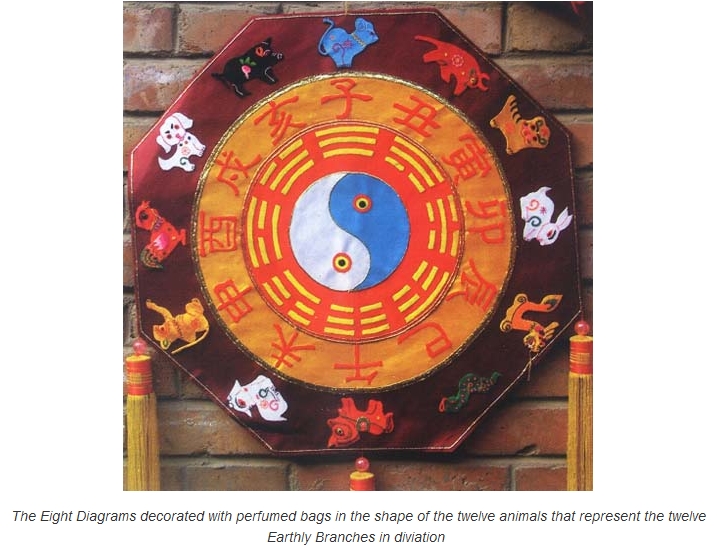
In Qingyang, whether in shops, on the streets or in peasant homes in the countryside, everywhere perfumed bags in a dazzling array of colors and shapes can be found: lanterns with designs of phoenix, fish and dragon; embroidered balls, clusters of butterflies, babies of happiness and longevity, and the 12 animals that represent the 12 Earthly Branches which symbolize the year in which a person is born. In Qingyang, almost every family has the tradition of making perfumed bags and at each Dragon Boat Festival the local people exchange perfumed bags and wear them.
A perfumed bag is also called "a lotus bag." The history of making and wearing perfumed bags can be traced to the Warring States Period. During the Tang and Song dynasties, perfumed bags gradually became an accessory, especially for women, and by the Qing Dynasty perfumed bags became tokens of love. In modern times perfumed bags are used primarily as presents during the Dragon Boat Festival, their main function being to solicit happiness and to drive out evil spirits.
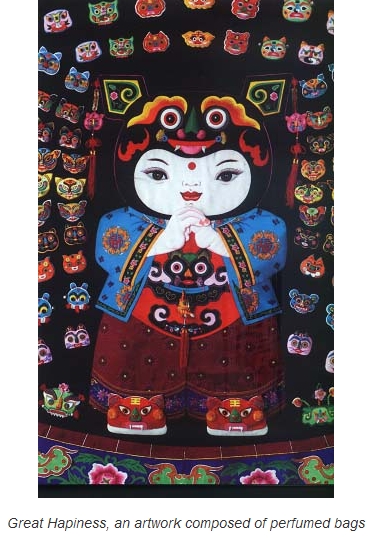
Perfumed bags have a long history in Qingyang, chiefly because there is a strong farming culture, where the men farm and the women weave. In addition to weaving and sewing, the women also create arts and crafts to enhance life and to present to others as token of friendship. Thus, perfumed bags came into existence and are now widely spread.
A perfumed bag is made in the following manner: first, patterns are cut out on paper and placed on silk or cloth, and the patterns are embroidered with colorful thread. Then the embroidered silk or cloth is sewn into bags of different shapes, filled with fiber and spices and sealed. The great popularity of the perfumed bags made in Qingyang is owed to the beautiful embroidery of eastern Gansu Province, which has a long tradition and a history dating to ancient times among peasant families. The women employ stitching methods such as broad embroidery, lock embroidery, patching embroidery, cross-stitch work, shorn piling, knotting, lock-stitching borders and encircling with golden thread.
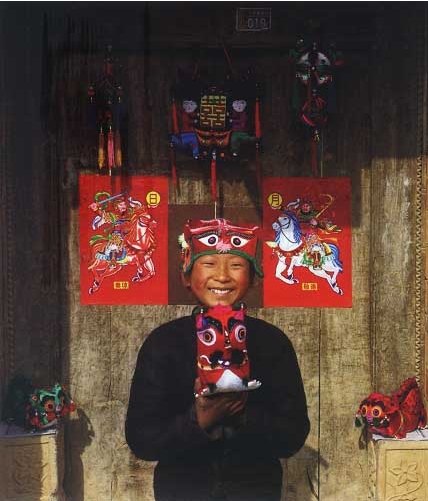
A boy wearing a hat in the shape of a tiger head. The children of Qingyang County disguise themselves as tiger cubs at every festival, including the New Year's Day and the Dragon Boat Festival, symbolizing good health and auspiciousness in the coming year.
Perfumed bags not only have an exterior beauty but also an interior beauty, fragrance. Depending on the purpose, the spices in the bags also differ. The types of fragrance in clued a faint fragrance that soothes, a delicate fragrance that is light and relaxing and a rose fragrance that refreshes the mind. Perfumed bags with different types of fragrance can be made into pillows, car trinkets and tokens of love.
Each type of perfumed bag has a metaphor. For instance, lotus flowers, water lilies, peonies and plum blossoms represent females; magpies on plum trees and bees gathering honey from flowers represent males; pines and cranes indicate longevity; pomegranates embody fertility; and double fish and double butterflies connote marital intimacy. Everywhere homophonic characters in the Chinese language are used as metaphors. For instance, for wishing that a newlywed couple gives birth to children at an early date (zao sheng gui zi), dates (zao), peanuts (huasheng), longan (guiyuan) and lotus seeds (lianzi) are used to form a pattern. Every kind of perfumed bag requires careful study. For instance, a perfumed bag called "Frog with Five Poisons" is made in the pattern of a frog with an embroidered scorpion, centipede, lizard, toad and snake and is to be worn by a little child. The idea is that poisons can be fought with poisons and that by wearing such a bag all poisons can be warded off.
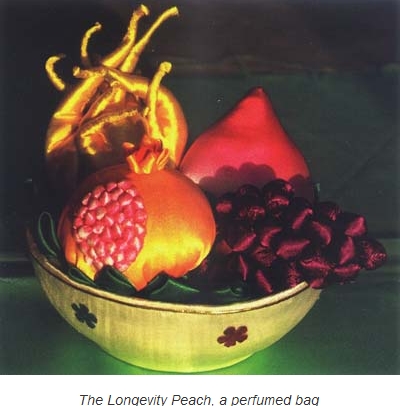
There is also a perfumed bag called "Xishui changliu," meaning "water flowing out in a trickle takes a long time to exhaust." It is bamboo wound in silk thread; usually the mother-in-law presents this to her daughter-in-law with the implication that she should live frugally. The perfumed bags used in wedding ceremonies also require thought. The one for the groom is called "festive lock" and the one for the bride is called "sweet lock."
Permeated with the secret hues of ancient philosophies, these perfumed bags impart a sense of a grand but primitive beauty. Most of the bags have multiple idols and primitive totems as their subject-matter. The perfumed bags with such rich contents and exquisite workmanship all come from the hands of rural women, the majority of whom have not been to school. How do they manage? It could be Mother Nature, which is associated with day and night, as well as a land that has grown a thick layer of culture several thousand years old, which have endowed them with such genius and abilities.




